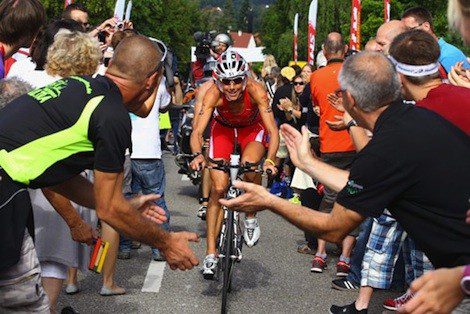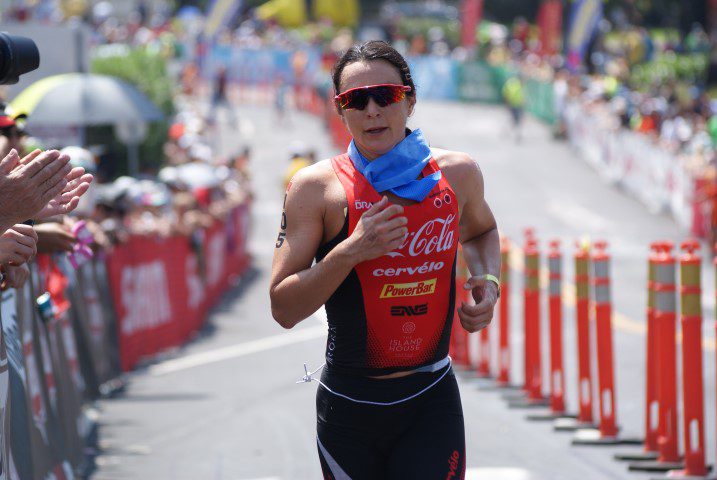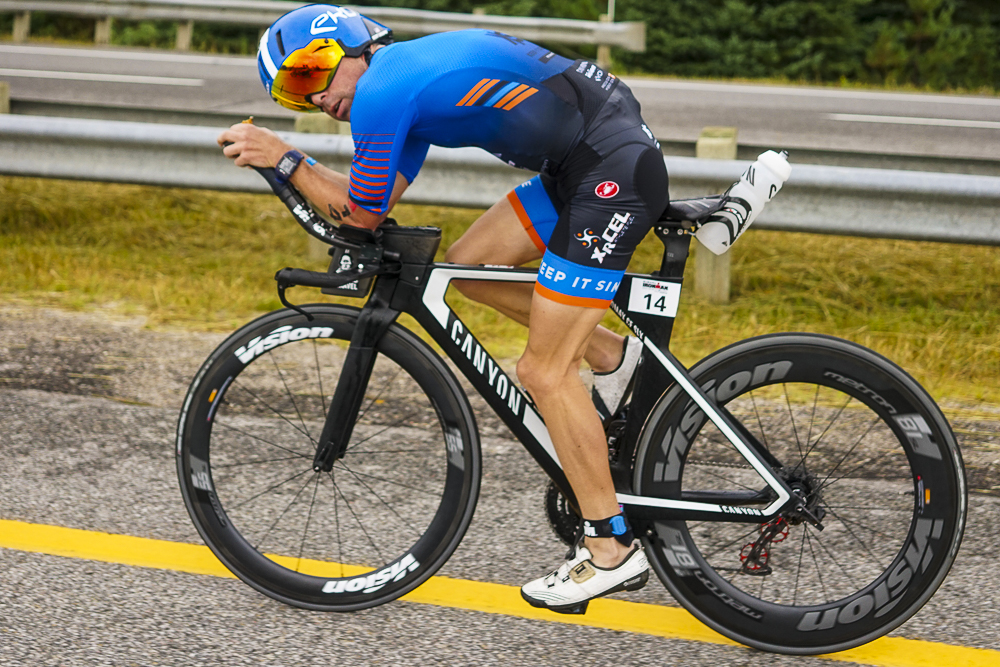How Chrissie Wellington’s legs sold the Professional Triathletes Organisation
A picture helped the PTO get the financial backing it needed to embark on an ambitious re-imagining of professional triathlon.
 Photo by:
www.challenge-roth.com
Photo by:
www.challenge-roth.com
It came down to a picture during his third meeting with the group. Charles Adamo was presenting to billionaire Michael Moritz and some of his partners at his company, Crankstart Investments. Adamo was trying to sell the people in the room on the Professional Triathletes Organisation (PTO) and the sport of triathlon.
“Why is your sport so special,” one of them asked.
“Our athletes are the best on the planet,” Adamo replied. “When the general sporting audience gets to see what these athletes are capable of, the sport will take off.”
Then, to prove his point, he put up a picture on the screen. It was a shot of four-time Ironman world champion Chrissie Wellington’s legs.
“These legs ran a 2:44 marathon after swimming 3.8 km and biking 180,” Adamo said.
One of the men in the room was an avid marathon runner. “That’s impossible,” he said.
“That’s the point,” Adamo replied.
“Do the paperwork and we’re in,” they said.
*******
So what is it that Charles Adamo was pitching to one of the wealthiest men on the planet, anyway? When it came time to announce the partnership with Moritz and Crankstart, Adamo provided the following quote for the press release: “The PTO has been working for a number of years to create an environment and structure where professional triathletes have a meaningful voice in the way the sport is operated and can contribute to its growth for the benefit of the entire triathlon community. We are very pleased to have teamed up with Crankstart Investments and Michael Moritz, who share our vision in the potential of the sport and the best means by which to see it grow and thrive.”
Which says it all, and doesn’t even come close at the same time. That statement doesn’t illustrate just how important Adamo has been in the process of creating a body that speaks on behalf of triathlon’s professionals. It doesn’t come close to showing how, when the world suddenly fell apart and many pro athletes had no idea how they were going to make ends meet as the world was turned upside down by the Coronavirus COVID-19 pandemic, Moritz and Crankstart came up an extra US$500,000 so they could hand out US$2.5 million to the top-100 pros in the world.
When I said to Adamo how impressed I was that the PTO was putting its money where its mouth is, he corrected me.
“We put our money where our heart is,” he said.

If I am to be honest, I was amongst the leaders of the sceptics when it came to the PTO a few years ago. My first real introduction to the group was in Germany in 2017 at a press conference where it was announced that the first-ever Collins Cup would take place at Challenge Roth the following year. On hand were Canadians Lisa Bentley and Simon Whitfield, along with Wellington, Adamo, Challenge Roth CEO Felix Walschoefer and Challenge Family CEO Zibi Szlufcik.
At that press conference we were told that the Collins Cup, which was to be modelled after Golf’s Ryder Cup with three teams – Europe, the USA and Internationals – competing against each other in a long-distance triathlon. Each team would consist of six men and women and the race for the Collins Cup would consist of 12 races of three athletes facing off against each other. Bentley and Whitfield were two of the four captains of the International squad. Wellington and Normann Stadler would captain the European team, while Mark Allen and Karen Smyers would lead the Americans.
The press in the room were told that there would be network coverage of the race shown around the world, including the United States. That’s when many of us wrote both the Collins Cup and the PTO off. We all knew that Ironman paid almost US$1 million a year for the production and air-time of it’s Hawaii world championship on NBC. There weren’t going to be networks clamouring to pay the PTO for the chance to televise six-plus hours of triathlon.
And there weren’t. The PTO had jumped on the chance to host the Collins Cup in Roth because they’d been assured by their media partner, Wasserman Group, that if the PTO could come up with a spectacular venue, they could help them put on a major event.
“To their credit,” Adamo says, “they came back to us a few months later and told us that it was turning out to be harder than they thought.”
The Collins Cup didn’t happen in 2018. It didn’t happen in 2019, either. It was supposed to happen in 2020 at the X-Bionicsphere in Samorin, Slovakia, but the Coronavirus COVID-19 pandemic forced its postponement for another year. With Moritz backing the venture, though, even the most sceptical no longer doubt that the Collins Cup will happen.
We also no longer doubt that Adamo’s vision of the PTO is truly coming to fruition.
*******
Getting Charles Adamo to admit that he’s been an integral part in the development of the PTO is more of a challenge than trying to take Jan Frodeno on in Kona. Before he’d even grant an interview I had to agree that there would be no pictures of him in the story. “The athletes are the story,” he says.
As much as he downplays his role in the creation of the PTO, those involved aren’t willing to do the same.
“Charles is a pretty modest guy,” says PTO board member Scott Defilippis. “This is 100 per cent philanthropic work for Charles. He’s constantly looking for ways to better the world.”
That bettering of the triathlon world started during Adamo’s self-admitted short triathlon career: “I don’t do triathlon,” he says, “I started, was very mediocre, got worse, then I quit.”
During his short time in the sport he met Lucy Gossage, a multiple Ironman champion from the United Kingdom. He was shocked to learn that an athlete who had finished in the top-10 in Kona and had garnered so many titles was struggling to make ends meet.
Seeing “kind of an injustice,” Adamo figured he might be able to help. After a successful career in hotel development with Kurzner International where he was involved with the company’s Atlantis hotels in The Bahamas and Dubai, Adamo “owns his own time,” which he puts into the PTO and helping to plan new churches and preaching.
“It’s a blessing to be able to help,” he says, “Hopefully by helping, others will be able to help, too.”
When he learned that a group of professionals had met at Challenge Bahrain in 2014 and created a group called the Professional Triathletes Union (PTU), he drafted a memo with some suggestions. It took him a while, but he finally managed to get that memo to PTU president Tim O’Donnell. Adamo encouraged the group to steer away from being a union.
“As a union, you’re one big grievance committee,” Adamo says. “You want to be more aspirational.”

The athletes bought in. Rachel Joyce, who along with O’Donnell is co-president of the PTO, credits Adamo with an ability to “think outside the box to breath some new perspective” into the athletes’ approach.
Joyce had been a key player in the 50 Women to Kona movement which tried to push Ironman into accepting the same number of professional women at the Ironman world champion as pro men.
“I thought it was the right thing to do,” Joyce, who worked as a lawyer in England before turning her sites to professional racing full time. “
After taking 2016 off to have her first child, Archie, Joyce noticed huge changes happening in the sport.
“When I came back to the sport in 2017, I saw that it was getting more and more difficult to be a professional triathlete,” she says. “It was harder to get sponsorship and prize money wasn’t increasing. I felt the future of long-course professional triathlon was at a cross road – it was either going to flourish, or fade away and become non-existant.”
“I met Charles – he was so tenacious,” she remembers. “I thought, if this guy can keep going, so can I.”
The athletes liked the idea of the Collins Cup, but once it became apparent that it wasn’t going to be the financial leg up the group needed, Adamo turned his sights on finding a partner. Last September the group hired former elite triathlete Sam Renouf as its CEO and the group sent out its first letter to Ironman expressing interest in acquiring the company’s triathlon assets.
“We spoke to lots of investors and almost all of them were interested,” Adamo says. “Then, when we talked about what we wanted to pay the athletes, almost all of them said ‘why are you paying the athletes so much? They would do it for half of that.’ It took a while, but when we met with Mike and his team, they didn’t blink an eye over athletes pay.”
And, of course, they were impressed by Chrissie Wellington’s legs.
*******
Adamo’s selfless attitude pervades throughout the organization. The hardest question he has to answer when pitching the PTO is “what are you getting out of it?” He’s not paid and says he doesn’t have an answer when people push him on what’s in it for him.
Which is why Adamo jumped on the phone to express his displeasure over a story I wrote in which I questioned whether the PTO would use its leverage with pro athletes to boycott Ironman races to put pressure on the company.
“We’re not that kind of organization,” Adamo said.
“One of the reasons it took so long (to find a financial partner) is because Charles knew that the partnership had to see the athletes as a partners as opposed to pawns,” Joyce says. “There’s no them and us – the professional athletes, by being organized, can contribute to the sport in a meaningful way. If we create superstars in the sport that’s good for the sport in general.”
“I believe that the professionals are undervalued,” Defilippis continues. “If we can get a hand at the table, we can make this sport go through the roof. At the moment we don’t have a seat at the table. The values that we are showing in the PTO, if we can bring that to the business, that would be special.”
Both Joyce and Defilippis are quick to point out that the real benefits the PTO will generate won’t help them.
“This is not about anyone racing today,” Defilippis says. “Yes, there are 200 athletes who are getting money and help right now, but, for me, this movement is about where we are going to be in 10 years.”
“Why am I doing this, putting all this time in?” Joyce asks, “Because I care about it – part of it is giving back to the sport. It was never about me. I care about triathlon and there being professional triathlon in five years.”

Defilippis and Joyce have a long list of goals they have for the PTO – support for retiring athletes, improved anti-doping measures, athlete development, to name just a few – but realize that those goals will take time.
Both see the recent payout to the top-100 men and women in the PTO rankings as both an important first step for the organization and incredibly satisfying all at once.
“One athlete reached out to me and told me she started crying when she read about the payments,” Joyce says. “Charles took it to a whole new level – this is where having good partners is so massive. They’ve had experience with hard times. (They realize) this is where you invest in your people. This is when people need it. Just from hearing back from athletes – the difference its going to make for people right now, it’s bringing such relief to athletes. I’ve always had belief in the PTO and this affirms to all the athletes that they do come first.”
The announcement of the Collins Cup and the infusion of cash has helped the pros rally around the organization. While the Collins Cup won’t happen in 2020 and Ironman has recently announced a new owner, the PTO is suddenly a big player in the world of triathlon. Thanks to the COVID-19 pandemic, racing has been thrown into turmoil in 2020, but the organization has stepped up with support for the pro athletes. They’ve put their money where their mouths – and hearts – are.
During my first interview with Adamo, he said that he envisioned the PTO would operate similar to the associations that govern professional golf and tennis. In 2017 I didn’t see that as a reality. Thanks to Chrissie Wellington’s legs, I’m not the only one who’s been turned from a sceptic to a believer.
This story originally appeared in the May, 2020 issue of Triathlon Magazine Canada.
